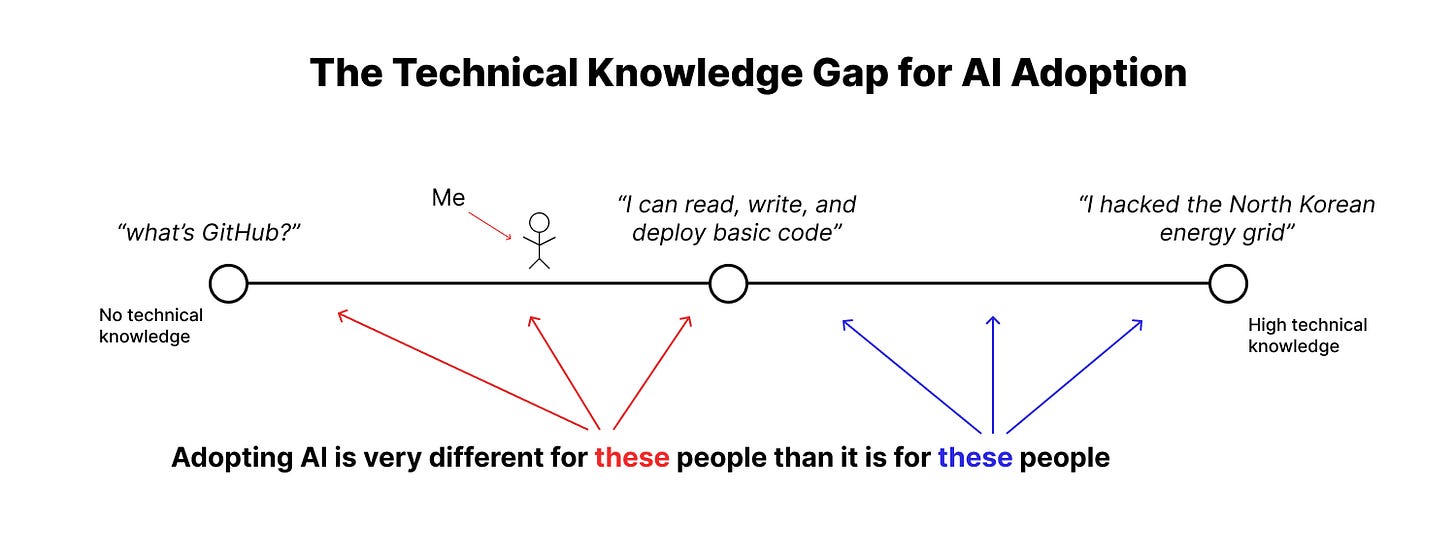The New Solo Founder's Journey
How a new generation of non-technical founders can use AI to build their projects
Welcome to v1 of My AI Co-Founder! If you’re interested in using AI for your project, or just want to stay up-to-date on practical AI applications, make sure you subscribe here:
No coding → no/low-code → AI co-founder
I’m not a developer. Before 2024, I had never coded or designed any app or website. In January, I started designing an app idea I had been talking about for years. Less than 4 months and $10k later, I have a fully-functional MVP for my app Contxt.
To get here, I hired a part-time developer to build Contxt in the no-code platform Draftbit. But employing an expert was more expensive than anticipated and limited my flexibility in contributing to the project due to the custom code my developer used. This was definitely the move to get me from 0 to MVP, but I need to write my own code so I can scale the product with my new co-founder: AI.
There’s been a lot of talk about AI enabling the next generation of non-technical founders and builders. Writing code in plain English, drafting entire UI screens with a couple well-crafted sentences, and 80% of code eventually being written by AI, are just some of the possibilities in our near-AI-future.
Knowledge gaps impacting AI adoption
Here’s the thing:
AI tools are the dumbest, most buggy, and least intelligent they’ll ever be. They’re improving fast and will only improve faster.
We’re in the very early days of AI, so those who explore and apply this technology from the beginning of their projects will be riding an exponential curve in sophistication as the AI capabilities get better and more nuanced.
The real problem right now is that there aren’t any tactical guides, workflows, or advice to guide non-technical folk people like me. The people who talk about how AI will empower everyone to code, typically already know how to code. So while their encouragement is appreciated and inspiring, it falls short of showing me how to actually do the thing. AI makes their life much easier, which is very different than the experience of a non-technical person wanting to use AI to actually write the code:
After 6+ years in tech as a creative director, community manager, customer success rep, and sales rep, I’m still in the red zone in the graph above and feel alone in figuring out how to use AI for my project.
How will non-technical people build alongside AI?
The purpose of My AI Co-Founder is twofold: to document my learnings, and then once I figure it out myself, provide answers, workflows, and frameworks to the questions those of us closer to the “What’s GitHub?” side of the spectrum have been asking ourselves:
How much practical know-how do I need to effectively interact with AI coding assistants?
If I have 1 month to ship something without any coding knowledge, what should I do?
How comfortable do I need to be with Figma to make good designs? Which AI tools help with this?
Which functions can be done by AI today and which ones require human involvement? How quickly is that changing?
What will be abstracted away by AI in 6 months and isn’t worthwhile to learn?
How do I debug an app and make sure I don’t fuck anything else up while doing so?
The biggest problems solo founders face are time/expenses and knowledge gaps for which they need to hire external help. Though still in their early stages, AI tools will soon enable lots of the menial work that would usually be dispersed across a founding team to be assigned to various AI agents to accomplish. With AI, a solo founder doesn’t feel as solo anymore. AI essentially buys us time to build with minimal costs until we can raise a round or find the perfect (human) co-founder fit. In the meantime, my solo-founder’s bootstrapped AI Co-Founder stack begins to look something like this:
$80/month for AI (dev tools, Claude, Co-Pilot, Loom, and Fathom)
$300/month for Upwork (details that neither me nor AI can do yet, especially design)
$35/month to upskill & communicate w AI - (I’m using Scrimba to learn coding today)
This is exciting because AI a) enables non-technical people to do technical things, and b) has great answers for most product-building questions and responds to follow-up questions with custom answers. This makes AI both a helpful collaborator and an incredible advisor/teacher to people who might otherwise have neither.
What you can expect from My AI Co-Founder
I think this is a fascinating shift that will only continue to grow, which is why I’m starting a Substack to document it via 4 different formats:
Tactical - Short pieces outlining the exact workflows, frameworks, and questions I use to interact with AI to fix my daily issues as a solo founder.
Case Studies - Sharing stories of other builders creating their dream software and sharing their own tactics they’ve found useful along the way.
Reflections - Ponderings on the promise and pitfalls of the AI revolution from the minds building it.
Interviews - Discussions with product leads from the AI tools I use, plus interviews with fellow solo founders building with an AI Co-Founder.
If you’re also a non-technical founder looking to build something alongside AI, an AI aficionado, or someone who just likes to stay in the know on different technological advances for solo entrepreneurs, I hope my Substack will be helpful to you.
It won’t be weekly, but it will be consistent, and you can subscribe below.


